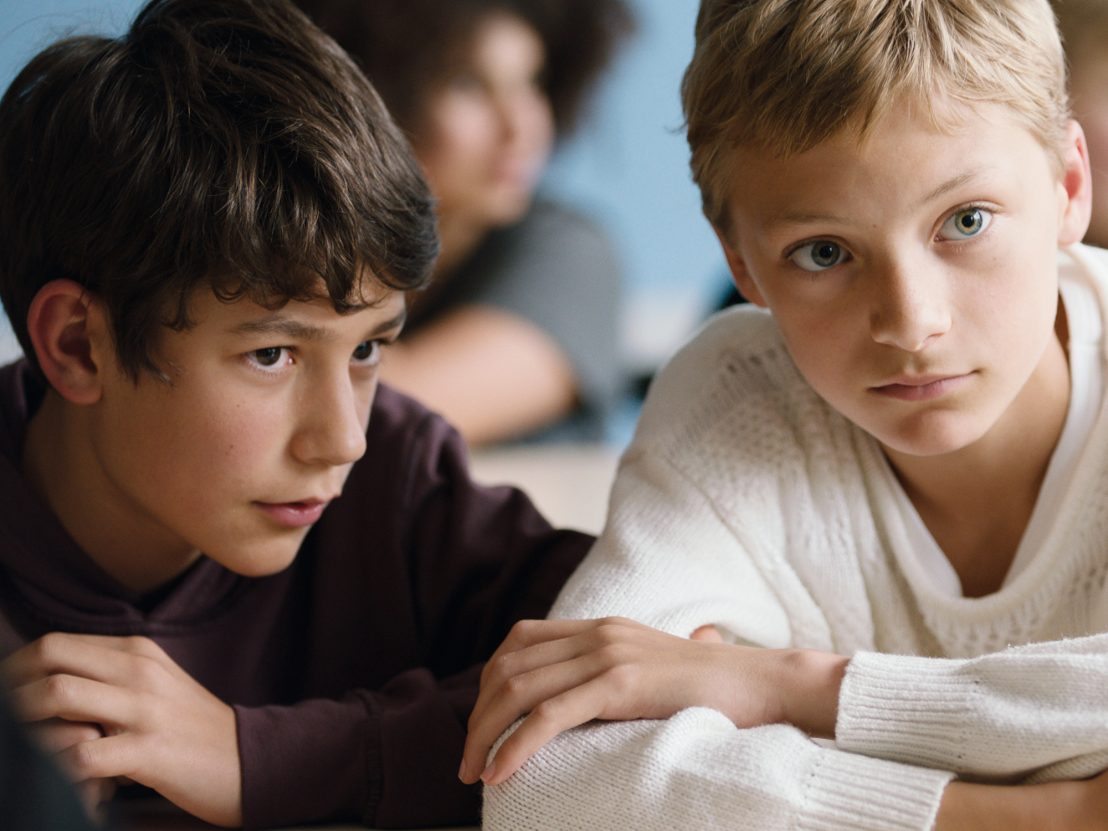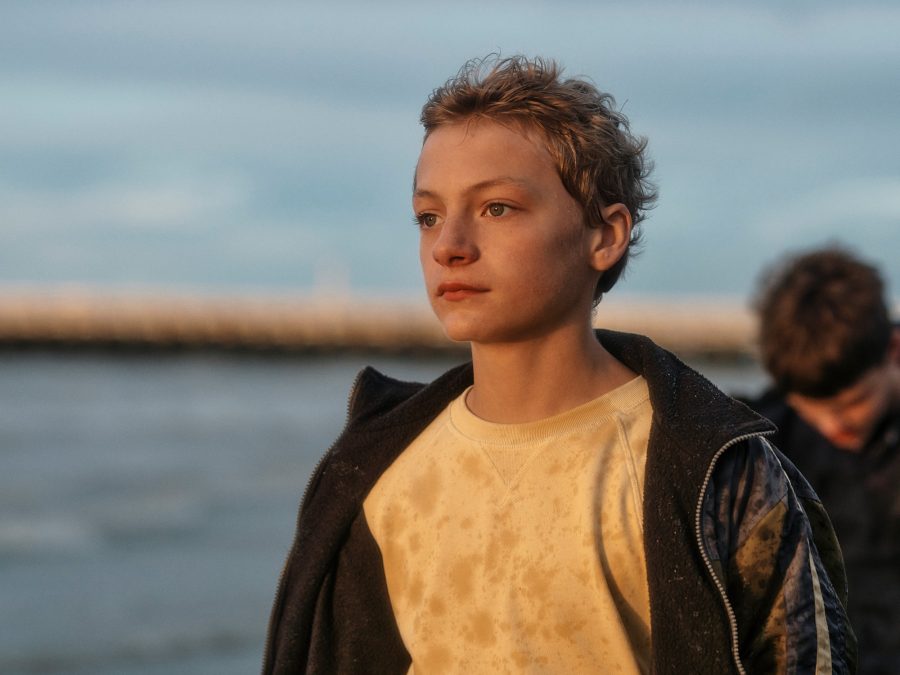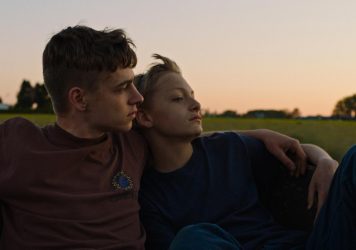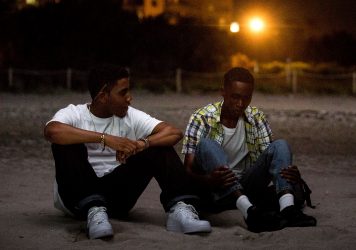
How Lukas Dhont’s Close adopts a more enlightened and empathetic approach to depicting young people on screen.
Casting an eye back over the long and storied history of cinema, it seems as if it’s only relatively recently that we’ve started to take kids seriously on screen. A film such as Lukas Dhont’s Oscar-nominated Close, about the intimacies and rituals that develop in the relationship between two pre-teen boys in a Belgian farming community, feels like a world away from the stereotypical depictions of children in Hollywood films of the late 20th century, where contrived precocity has always been the order of the day.
In Close, the two boys at the centre of the drama, played by Eden Dambrine and Gustav de Waele, are written as being emotionally mature rather than having discernable adult feelings and words placed in their heads/mouths. In the film they play 13-year-olds Léo and Rémi (respectively), best friends whose bond verges on the brotherly. However as they start a new school year, the changeable tides of adolescence place pressure on a relationship of singular closeness. There are hints, too, that the pair are experiencing the initial pangs of impulses that they may not yet have the psychological apparatus to discern or decipher.
The film also suggests that, sometimes, when we feel things we don’t understand, our bodies and minds can switch into panic mode. Close is a film which searches for an objective, albeit fleeting authenticity rather than using its protagonists as cyphers for the makers’ own nostalgia (although, personal experience no doubt plays a part in the telling of the tale). Dhont has form in this domain, as Close is a follow-up to his drama Girl, about a trans teenage ballet dancer’s fraught and sometimes shocking journey towards gender affirmation.
One of the great films about childhood which cuts a fine balance between the romantic and the tragic is Maurice Pialat’s L’Enfance Nue (Naked Childhood) from 1968, which forges a tender character study around a behaviorally-challenged orphan who is being passed through the brutal French foster care system. The lyricism and thirst for genuine understanding displayed by its maker makes this a revolutionary film in its own modest way and, like Close, it is an attempt to look at a child while kneeling down to meet their own eye-line. Pialat was fascinated by the idea of empowering youth on screen, and did so in films such as Graduate First (1978) and A Nos Amours (1983).

Though there are notable great childhood films from around the globe (Yazujiro Ozu’s Good Morning from Japan, Andrei Tarkvosky’s Ivan’s Childhood from Russia, Victor Erice’s The Spirit of the Beehive from Spain), it seems that France remains at the vanguard of creating challenging and empathetic portraits of confused and bemused youth. Indeed, Celine Sciamma has made it the basis of her career, exploring pre-teen lesbian desire in her aquatic wonder from 2007, Water Lilies, and exploring similar themes again in young women with her Sight and Sound poll-plundering Portrait of a Woman on Fire from 2019.
Perhaps the film which operates best as a handy forerunner to Close is Sciamma’s gorgeous 2011 film Tomboy, about a gender non-conforming 10-year-old (Zoé Héran) and how their casual defiance of perceived social norms plays out among a group of largely untroubled peers. It also explores the relationship that blossoms between Héran’s Laure (who identifies as Mickaël to friends) and Jeanne Disson’s Lisa, offering a celebration of honest desire which boldly intimates that love and friendship come from a place of primal provenance that doesn’t ascribe to rigidly imposed or archaic ways of thinking about sex and gender.
Though the lineage of Hollywood cinema has given us the crass comic archetype of the child comic relief, it has through sheer volume of product also used kids as an outlet for moral panic (Larry Clark’s Kids, or Catherine Hardwicke’s Thirteen) and as a locus for nostalgic wonderment and adventure (Stephen Spielberg’s ET, Richard Donner’s The Goonies).
However, two more recent titles have gone about challenging these mainstream standards of kids being used as a way to talk about adult concerns, and they are Barry Jenkins’ Moonlight (2016) and Eliza Hittman’s Beach Rats (2017). Both of these films adopt a more European sensibility in asking thoughtful questions about the sometimes banal, sometimes transcendent trials of growing up outside of a conventional middle class family unit. The former subtly frames the evolution of gay consciousness against hardscrabble Black lives in a Miami suburb overrun with drugs and unchanneled machismo. The latter, meanwhile, offers a non-judgemental depiction of a sexually-fluid Brooklyn-based loner and the confort he feels in using his body as a commodity.
Close draws on the work started by Hittman, Jenkins and Sciamma while also offering something new into the mix, namely its attempts to comprehend just how a person of limited emotional capabilities might react to an event they might struggle to comprehend as being even possible. It’s a film which stands back and comes forward at the right moments, giving its protagonists space to explore the extent of the pain and joy they experience from one moment to the next.
CLOSE is in UK and Irish cinemas now, and streaming on MUBI from April 21. Find your nearest screening here: mubi.com/close
Don’t forget you can watch CLOSE with 2 months of MUBI GO for just £20. That’s eight trips to the cinema, plus streaming anytime. Offer ends March 10: mubi.com/promos/go20_lwl
Published 3 Mar 2023

The dissolution of a tight friendship and a subsequent tragedy have a profound impact on the life of 13-year-old Léo in Lukas Dhont's poignant drama.

By Elena Lazic
The director of Portrait of a Lady on Fire discusses her monument to female artists and their intense gaze.

By Josh Lee
By not showing physical intimacy, Barry Jenkins allows sexuality to surface in his film in other ways.